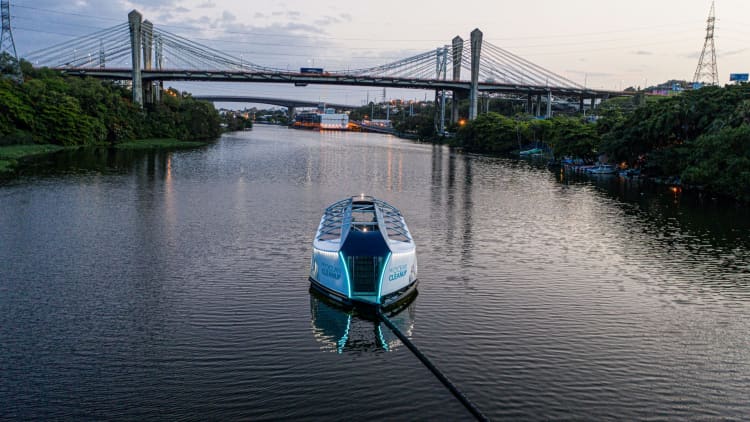
[ad_1]
Smoke hangs over the Oakland-San Francisco Bay Bridge in San Francisco, California, on Wednesday, Sept. 9, 2020.
David Paul Morris | Bloomberg | Getty Images
California and other Western states are experiencing dirtier air quality due to worsening heat, drought and wildfires, and communities of color are disproportionately exposed to pollution, according to a report published by the American Lung Association on Wednesday.
The “State of the Air” report found that nearly 120 million people, more than a third of the population, lived in areas with unhealthy levels of air pollution between 2019 and 2021. And more than 64 million people of color lived in counties with higher levels of pollution, comprising more than half of people who live with unhealthy air quality, the report showed.
Cities in the Western U.S., where climate change has driven worsening heat waves, drought and wildfires, ranked among the highest polluted areas for ground-level ozone pollution and fine particulate-matter air pollution, the report found.
The report assigned letter grades reflecting the number of days that air quality in a specific area reached unhealthy levels on the Air Quality Index. Particle pollution refers to tiny pollutants from sources like factories, power plants, vehicles and wildfires, while ozone smog comes from vehicles, factories or other industrial sources.
Between 2019 and 2021, roughly 103 million people lived in the 124 counties that earned an F grade for ozone smog. Exposure to unhealthy levels of ozone air pollution makes breathing difficult for more people across the U.S. than any other single pollutant, the report said.
Californian cities lead the rankings of the most polluted cities in the country:
Top 10 cities with the worst ozone pollution:
- Los Angeles-Long Beach, CA
- Visalia, CA
- Bakersfield, CA
- Fresno-Madera-Hanford, CA
- Phoenix-Mesa, AZ
- Denver-Aurora, CO
- Sacramento-Roseville, CA
- San Diego-Chula Vista-Carlsbad, CA
- Houston-The Woodlands, TX
- Salt Lake City-Provo-Orem, UT
Meanwhile, more than than 64 million Americans reside in counties with F grades for spikes in daily particle pollution. Wildfires in the region were a major factor in the increasing number of days and places with unhealthy levels of particle pollution, the report found.
Bakersfield, which is located north of LA, ranked No. 1 for both daily and year-round particle pollution:
Top 10 cities with the worst daily particle pollution:
- Bakersfield, CA
- Fresno-Madera-Hanford, CA
- Fairbanks, AK
- Visalia, CA
- Reno-Carson City-Fernley, NV
- San Jose-San Francisco-Oakland, CA
- Redding-Red Bluff, CA
- Sacramento-Roseville, CA
- Chico, CA
- Los Angeles-Long Beach, CA
Top 10 cities with the worst year-round particle pollution:
- Bakersfield, CA
- Visalia, CA
- Fresno-Madera-Hanford, CA
- Los Angeles-Long Beach, CA
- Fairbanks, AK
- Sacramento-Roseville, CA
- Medford-Grants Pass, OR
- Phoenix-Mesa, AZ
- San Jose-San Francisco-Oakland, CA
- Indianapolis-Carmel-Muncie, IN
Air pollution takes more than two years off the average global life expectancy, according to the Energy Policy Institute at the University of Chicago. Sixty percent of particulate-matter air pollution comes from fossil fuel combustion.
The report found that people of color are almost four times as likely as white people to reside in an area with unhealthy ozone smog and particle pollution levels.
Harold Wimmer, national president and CEO of the American Lung Association, in a statement, said national ozone pollution levels are improving but that “not all communities are seeing improvements.”
“This is why it is crucial to continue our efforts to ensure that every person in the U.S. has clean air to breathe,” Wimmer said.
The report used data from air-quality monitors managed by state, local and tribal air pollution control authorities in counties across the country. The authors noted that more than 71 million Americans live in counties where ozone and particle pollution levels are currently not being monitored.
The authors of the report noted that climate change is making it more difficult to protect human health because disasters like heat, drought and wildfires are exacerbating high ozone levels and increases in fine particulate matter.
The American Lung Association called on the Biden administration to move forward with several measures to clean up national air pollution, including new limits on ozone and particle pollution and new measures to mitigate emissions from power plants and vehicles.

[ad_2]
Source link